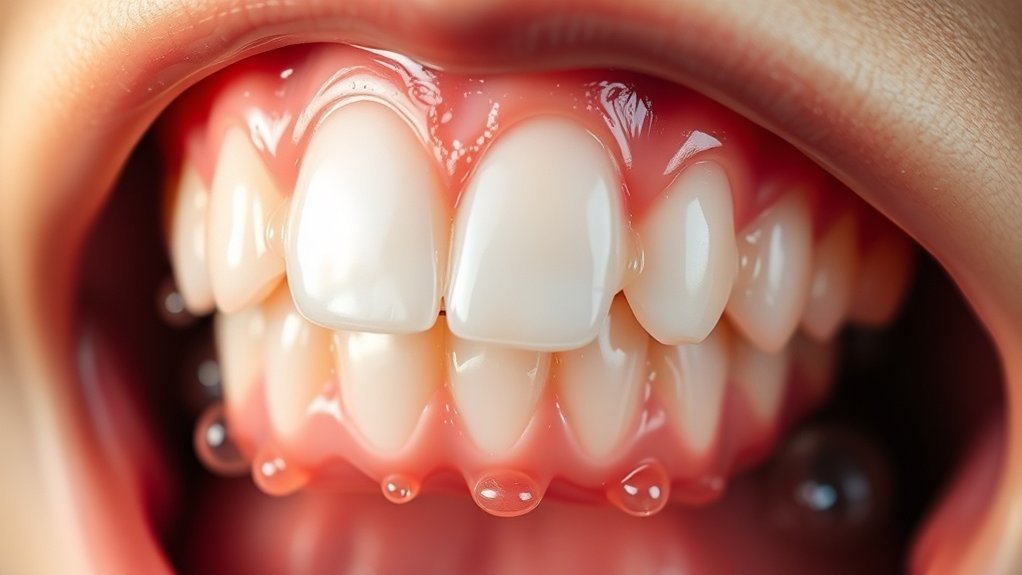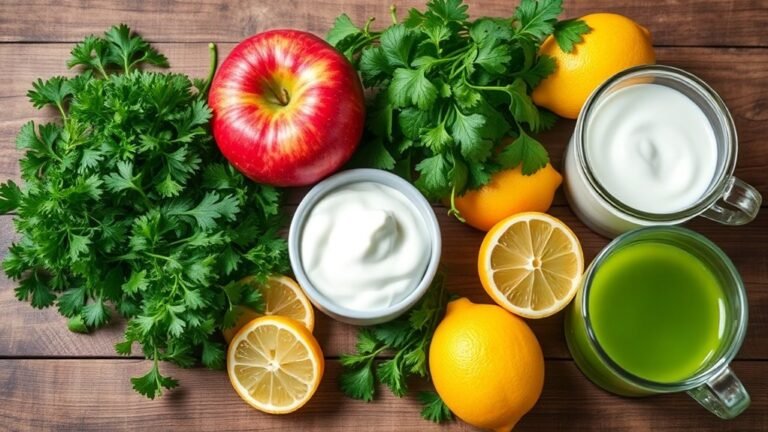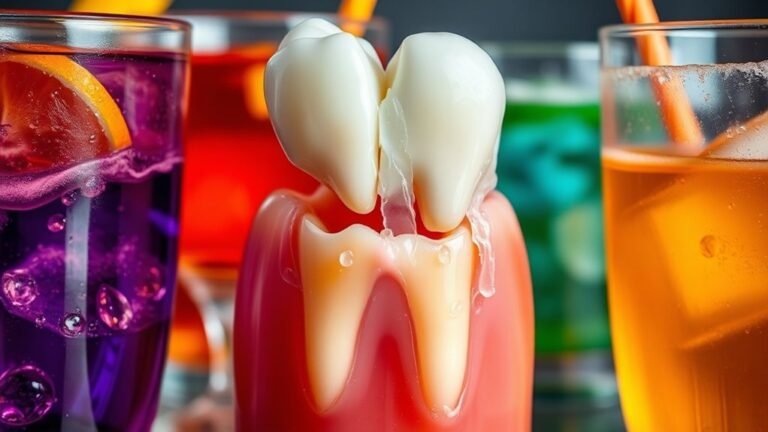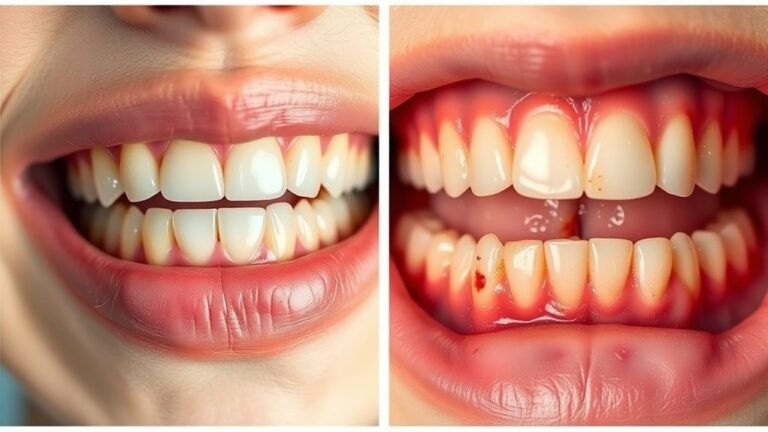Maintaining Healthy Saliva Flow Protects Enamel and Prevents Sensitivity
Maintaining healthy saliva flow is vital for protecting your tooth enamel and preventing sensitivity. Saliva naturally neutralizes harmful acids, provides essential minerals for remineralization, and washes away food particles. Factors like hydration, diet, stress, and certain medications can influence saliva production. By staying hydrated and chewing sugar-free gum, you can stimulate saliva flow. Remember, a balanced oral environment supports enamel health and reduces sensitivity. Discover more tips and strategies to enhance your saliva production and oral health.
Key Takeaways
- Adequate hydration supports optimal saliva production, crucial for enamel protection and reducing tooth sensitivity.
- Chewing sugar-free gum stimulates saliva flow, aiding in enamel remineralization and plaque prevention.
- Consuming tart foods can encourage salivary gland activity, helping maintain a neutral pH in the mouth.
- Practicing good oral hygiene helps create an environment conducive to healthy saliva flow and enamel health.
- Managing stress through relaxation techniques can positively impact saliva production, reducing the risk of sensitivity.
The Role of Saliva in Oral Health
Saliva plays an essential role in maintaining oral health, acting as your mouth’s natural defense mechanism. It helps regulate saliva flow, which is fundamental for effective oral hygiene. Saliva contains enzymes and minerals that break down food particles, preventing plaque buildup and reducing the risk of cavities. This natural fluid also aids in the remineralization of tooth enamel, offering necessary enamel protection against acids produced by bacteria. Additionally, saliva neutralizes harmful acids and maintains a balanced pH, further promoting a healthy oral environment. When saliva flow is ideal, you’re less likely to experience dry mouth, which can lead to oral health issues. Prioritizing hydration and regular dental check-ups can support healthy saliva production, enhancing your overall oral hygiene.
How Saliva Protects Tooth Enamel
Your mouth’s natural defense not only aids in digestion but also plays a significant role in protecting tooth enamel. Saliva contains essential minerals like calcium and phosphate, which help remineralize enamel, strengthening it against acid attacks from food and beverages. Additionally, saliva maintains a neutral pH, counteracting acidity that can erode enamel and contribute to tooth sensitivity. By facilitating the washout of food particles and neutralizing harmful bacteria, saliva helps create a healthier oral environment. This dual action of remineralization and neutralization is fundamental for tooth sensitivity prevention, as it reduces the risk of enamel erosion and subsequent exposure of sensitive dentin. Keeping your saliva flow healthy is essential for long-term dental health.
The Link Between Saliva and Tooth Sensitivity
When the flow of saliva decreases, the risk of tooth sensitivity can markedly increase. Saliva plays a vital role in protecting your teeth and maintaining oral health. Without adequate saliva, you may experience heightened sensitivity due to several factors:
- Reduced buffering capacity: Saliva neutralizes acids that can erode enamel.
- Decreased remineralization: Saliva helps restore minerals to your teeth, strengthening them.
- Impaired lubrication: A dry mouth can lead to friction during chewing, increasing discomfort.
- Increased bacterial growth: Low saliva levels can promote harmful bacteria, contributing to decay.
- Altered taste sensations: Reduced saliva affects your ability to enjoy food, impacting your overall well-being.
Maintaining healthy saliva flow is essential to prevent tooth sensitivity and guarantee ideal dental health.
Factors That Affect Saliva Production
What influences saliva production in the mouth? Several factors play an essential role in determining how much saliva your body produces. First, hydration levels are critical; when you’re well-hydrated, your salivary glands function at their best. Diet also matters; acidic and spicy foods can stimulate saliva production, while dry or overly sweet foods may not. Stress and anxiety impact your body’s ability to produce saliva, often leading to a dry mouth. Medications, particularly antihistamines and certain antidepressants, can reduce saliva flow. Additionally, age affects production; older adults may experience a decrease in saliva output. Finally, health conditions like diabetes or autoimmune diseases can hinder your salivary glands, affecting their ability to produce saliva effectively.
Common Causes of Reduced Saliva Flow
Reduced saliva flow can arise from various common causes that greatly impact oral health. Identifying these factors is essential for maintaining your enamel and preventing sensitivity. Here are some common contributors to reduced saliva production:
- Medications: Many prescriptions, including antihistamines and antidepressants, can lead to dry mouth.
- Dehydration: Insufficient water intake can greatly decrease saliva levels.
- Medical conditions: Disorders like diabetes or Sjögren’s syndrome directly affect saliva flow.
- Radiation therapy: Treatments for head and neck cancers often impair salivary glands.
- Nerve damage: Injuries to nerves controlling saliva production can result in decreased flow.
Understanding these causes enables you to take proactive steps to protect your oral health.
Tips for Promoting Saliva Production
How can you encourage your body to produce more saliva? Start by staying hydrated; drinking plenty of water is essential. Chewing sugar-free gum or sucking on sugar-free candies stimulates saliva flow through the act of chewing and sucking. You might also consider incorporating tart flavors into your diet, as they can trigger salivary glands. Regularly practicing good oral hygiene, including brushing and flossing, can help maintain an ideal environment for saliva production. If you smoke, quitting can greatly improve saliva flow. Additionally, managing stress through relaxation techniques can positively impact your salivary function. Finally, consult your healthcare provider for personalized advice or if you suspect a medical condition affecting your saliva production.
Foods and Drinks That Support Saliva Health
While you may not realize it, the foods and drinks you consume play an essential role in supporting your saliva health. A balanced diet can enhance saliva production, helping to protect your enamel and reduce sensitivity. Here are some key items to include:
- Water: Staying hydrated is vital for saliva production.
- Citrus fruits: Oranges and lemons stimulate saliva flow due to their acidity.
- Crunchy vegetables: Carrots and celery help cleanse the mouth and promote saliva.
- Whole grains: Foods like brown rice and whole wheat bread provide necessary fiber.
- Dairy products: Cheese and yogurt can neutralize acids in the mouth, supporting saliva health.
Incorporating these foods and drinks into your daily routine can greatly boost your saliva production and overall oral health.
When to Seek Help for Saliva-Related Issues
Even with a diet rich in saliva-promoting foods and drinks, some individuals may still experience issues with saliva production. If you notice persistent dryness in your mouth, difficulty swallowing, or increased sensitivity in your teeth, it’s time to seek professional help. These symptoms could indicate a condition like xerostomia, which may require intervention. Additionally, if you experience bad breath or changes in taste, don’t ignore these signs. Consult your dentist or healthcare provider for a thorough evaluation. They can recommend treatments, lifestyle adjustments, or medications to enhance saliva flow. Remember, managing saliva-related issues is vital for your oral health, preventing complications like tooth decay and gum disease. Don’t hesitate to reach out for assistance when needed.
Frequently Asked Questions
Can Children Experience Reduced Saliva Flow Like Adults?
Yes, children can experience reduced saliva flow, just like adults. Factors such as dehydration, medications, or certain health conditions can contribute to this issue, potentially affecting their oral health and comfort during daily activities.
Are There Medications That Increase Saliva Production?
Yes, certain medications like pilocarpine and cevimeline can boost saliva production. Think of them as watering your garden; they help quench your mouth’s thirst. Always consult your doctor for suitable options tailored to your needs.
How Does Aging Affect Saliva Production?
As you age, saliva production often decreases due to hormonal changes, medications, and health conditions. This reduction can lead to dry mouth, making you more susceptible to dental issues and affecting overall oral health.
Can Stress Impact Saliva Flow in the Mouth?
Yes, stress can greatly impact saliva flow. When you’re anxious or overwhelmed, your body may produce less saliva, leading to dryness. This can affect oral health, making it essential to manage stress effectively for your mouth’s well-being.
Is There a Connection Between Hydration and Saliva Production?
Yes, hydration directly affects saliva production. When you’re well-hydrated, your body generates more saliva, promoting oral health. Conversely, dehydration can lead to dry mouth, reducing saliva flow and potentially resulting in discomfort and dental issues.
Conclusion
Maintaining healthy saliva flow is essential for protecting your enamel and preventing tooth sensitivity. Notably, studies show that nearly 20% of adults experience dry mouth at some point, which can lead to increased dental issues. By understanding the important role saliva plays in oral health and taking steps to promote its production, you can safeguard your smile. Remember, a well-hydrated mouth not only keeps your teeth strong but also enhances your overall oral comfort and health.






